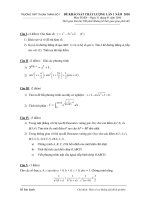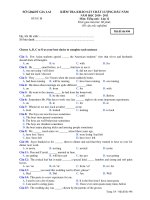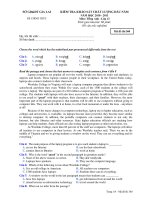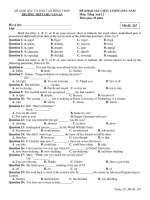ĐỀ KHỎA SÁT CHẤT LƯỢNG LẦN 1 MÔN: TIẾNG ANH - 12
Bạn đang xem bản rút gọn của tài liệu. Xem và tải ngay bản đầy đủ của tài liệu tại đây (129.79 KB, 6 trang )
<span class='text_page_counter'>(1)</span><div class='page_container' data-page=1>
SỞ GIÁO DỤC & ĐÀO TẠO
<b>TRƯỜNG THPT BẾN TRE</b>
<b>KHẢO SÁT CHẤT LƯỢNG CHUYÊN</b>
<b><sub>ĐỀ LẦN 1 </sub></b>
<b>TIẾNG ANH 12</b>
<i>Thời gian làm bài:90 phút; </i>
<i>(80 câu trắc nghiệm)</i>
<b>Mã đề thi 628</b>
Họ, tên thí sinh:... SBD: ...
<b>Fill in each numbered blank with one suitable word or phrase.</b>
Romance is the opportunity to show your loved one 1______ special he/she is to you. It means
2______ the time for them, and sharing time together, even 3______ you are very busy. It does not mean
thinking only about yourself, or having only your needs 4______ . It means putting your spouse first.
Here are some ideas to spice up your romance:
1. Do small acts of kindness, such as give him/her flowers, or a little gift, or 5______ a poem, etc.
2. 6______ "Thank you" and "I Love You" often.
3. Be considerate 7______ his/her feelings and sorrows.
4. Take long walks together - anywhere.
5. Share jokes at mealtime. 8______ is a great way to share one's love.
6. Visit a museum, visit community festivals, tour a new site, or attend a party together.
7. Hug and kiss often.
If your spouse does not do things for you, then show him/her by gently 9______ out what you like. If
you like flowers for your birthday and you have not gotten flowers, then let him/her know, 10_____
when he/she asks you what you would like. Do not think they can read your mind.
<b>Câu 1: </b> <b>A. that</b> <b>B. how</b> <b>C. what</b> <b>D. which</b>
<b>Câu 2: </b> <b>A. taking</b> <b>B. take</b> <b>C. took</b> <b>D. taken</b>
<b>Câu 3: </b> <b>A. when</b> <b>B. but</b> <b>C. if</b> <b>D. as</b>
<b>Câu 4: </b> <b>A. looked</b> <b>B. noticed</b> <b>C. seen</b> <b>D. met</b>
<b>Câu 5: </b> <b>A. invent</b> <b>B. write</b> <b>C. search</b> <b>D. discover</b>
<b>Câu 6: </b> <b>A. tell</b> <b>B. talk</b> <b>C. say</b> <b>D. ask</b>
<b>Câu 7: </b> <b>A. on</b> <b>B. with</b> <b>C. of</b> <b>D. up</b>
<b>Câu 8: </b> <b>A. Laughter</b> <b>B. Laughably</b> <b>C. Laugh</b> <b>D. Laughable</b>
<b>Câu 9: </b> <b>A. carrying</b> <b>B. pointing</b> <b>C. making</b> <b>D. giving</b>
<b>Câu 10: A. generally</b> <b>B. wholly</b> <b>C. fortunately</b> <b>D. particularly</b>
<b>Mark the letter A, B, C, or D on your answer sheet to show the underlined part that needs</b>
<b>correction in each of the following questions.</b>
<b>Câu 11: Hardly has the performance begun, the lights went out.</b>
A B C D
<b>Câu 12: Last week Mark told me that he got very bored with his present job and </b>
A B
is looking for a new one.
C D
<b>Câu 13: Fiber is important element in nutrition, and it aids in protecting the</b>
A B C
digestive tract as well.
D
</div>
<span class='text_page_counter'>(2)</span><div class='page_container' data-page=2>
<b>Câu 15: My brother decided to buy in the morning a new bike, but in the afternoon </b>
A B C
he changed his mind.
D
<b>Choose the word which is stressed differently from the rest.</b>
<b>Câu 16: A. romantic</b> <b>B. partnership</b> <b>C. actually</b> <b>D. attitude</b>
<b>Câu 17: A. believe</b> <b>B. marriage</b> <b>C. response</b> <b>D. maintain</b>
<b>Câu 18: A. summary</b> <b>B. decision</b> <b>C. physical</b> <b>D. different</b>
<b>Câu 19: A. attractiveness</b> <b>B. American</b> <b>C. traditional</b> <b>D. generation</b>
<b>Câu 20: A. couple</b> <b>B. equal</b> <b>C. certain</b> <b>D. decide</b>
<b>Choose the word which has the underlined part pronounced differently from the rest.</b>
<b>Câu 21: A. rare</b> <b>B. are</b> <b>C. declare</b> <b>D. share</b>
<b>Câu 22: A. loves</b> <b>B. joins</b> <b>C. cooks</b> <b>D. spends</b>
<b>Câu 23: A. advises</b> <b>B. raises</b> <b>C. goes</b> <b>D. devises</b>
<b>Câu 24: A. chore</b> <b>B. teacher</b> <b>C. school</b> <b>D. children</b>
<b>Câu 25: A. hurry</b> <b>B. rush</b> <b>C. pressure</b> <b>D. under</b>
<b>Choose the sentences - A, B ,C or D - which is closest in meaning to the printed one.</b>
<i><b>Câu 26: Sorry, I took you for someone else.</b></i>
<b>A. Sorry, I took you instead of somebody else.</b>
<b>B. Sorry, I asked somebody else to take you.</b>
<b>C. Sorry, I made a mistake in taking you to someone else.</b>
<b>D. Sorry, I thought you were somebody else.</b>
<i><b>Câu 27: Dave had to take a cut in pay to keep from losing his job.</b></i>
<b>A. Dave was given a salary increase.</b> <b>B. Dave had an accident on the job.</b>
<b>C. Dave's salary was lowered.</b> <b>D. Dave lost his job and had to cut in pay.</b>
<i><b>Câu 28: He makes a better husband than father.</b></i>
<b>A. His father is better than her husband.</b>
<b>B. Fathers are usually good husbands.</b>
<b>C. He tries to be a good husband and father.</b>
<b>D. He is more successful as a husband than as a father.</b>
<i><b>Câu 29: I wish George had come to Italy with us.</b></i>
<b>A. I am pleased that George came to Italy with us.</b>
<b>B. I hope that George will go to Italy with us.</b>
<b>C. I am sorry that George isn't going to Italy with us.</b>
<b>D. I am sorry that George didn't come to Italy with us.</b>
<i><b>Câu 30: You can enrich your knowledge by listening to the radio.</b></i>
<b>A. Listening to the radio makes your knowledge rich.</b>
<b>B. Listening to the radio makes you know less.</b>
<b>C. Listening to the radio makes you know more.</b>
<b>D. Listening to the radio enables you to be rich.</b>
<b>Read the passage and circle the best option A, B, C, or D to complete the following questions or</b>
<b>statements</b>
</div>
<span class='text_page_counter'>(3)</span><div class='page_container' data-page=3>
It seems very obvious that being born with the right qualities from gifted parents will increase a child’s
ability to do well. However, this ability will be fully realized only with the right upbringing and
opportunities. As one psychologist says, <i><b>“</b></i><b>To have a fast car, you need both a good engine and fuel.”</b>
Scientists have recently assessed intelligence, achievement, and ability in 50 sets of identical twins that
were separated shortly birth and brought up by different parents. They found that achievement was based
on intelligence, and later influenced by the child’s environment.
One case involving very intelligent twins was quoted. One of the twins received a normal upbringing,
and performed well. The other twin, however, was brought up by extremely supportive parents and given
every possible opportunity to develop its abilities. That twin, though starting out with the same degree of
intelligence as the other, performed even better.
This case reflects the general principle of intelligence and ability. The more <b>favorable</b> the
environment, the more a child’s intelligence and ability are developed. However, there is no link between
intelligence and socioeconomic level of a child’s family. In other words, it does not matter how poor or
how rich a family is, as this does not affect the intelligence.
Gifted people can not be created by supportive parents, but they can be developed by them. One
professor of music said that outstanding musicians usually started two or three years earlier than ordinary
performers, often because their parents had recognized their ability. These musicians then needed at least
ten years’ hard work and training in order to reach the level they were capable of attaining.
People who want to have very gifted children are given the following advice:
- Marry an intelligent person.
- Allow children to follow their own interests rather than the interests of the parents.
- Start a child’s education early but avoid pushing the child too hard.
Encourage children to play; for example, playing with musical instrument is essential for a child who
wants to become an outstanding musician.
<b>Câu 31: </b>When scientists studied intelligence and ability in twins, they found that ________
<b>A. </b>ability depends mainly on intelligence and achievement
<b>B. </b>ability depends both on intelligence and environment
<b>C. </b>intelligence and development are irrelevant to ability
<b>D. </b>different twins generally have different levels of ability
<b>Câu 32: </b>Scientists chose twins for their study because __________
<b>A. </b>they have the same economic background and hence the same opportunities
<b>B. </b>each twin has the same environment as his/ her twin
<b>C. </b>they are born into the same family, hence the same upbringing
<b>D. </b>they have the same genetic background, usually with similar intelligence
<b>Câu 33:</b> How were great musicians different from ordinary musicians in their development?
<b>A. </b>They practice playing their instruments for many years
<b>B. </b>Their ability was realized at an early stage and then nurtured
<b>C. </b>They were exceptionally intelligent and artistic
<b>D. </b>They concentrated on music to the exclusion of other areas
<b>Câu 34: </b>The writer advises that gifted children should be allowed to follow ______________
<b>A. </b>only their interests in computer games <b>B. </b>their parents’ interests
<b>C. </b>only their interests in musical instruments <b>D. </b>their own interests
<b>Câu 35: </b>When encouraging their gifted children, parents should avoid _____________
<b>A. </b>starting their education at an early age <b>B. </b>letting them play their own way
<b>C. </b>permitting them to follow their own interests <b>D. </b>pushing their children too hard
<b>Câu 36: </b>The remark: “<i><b>To have a fast car, you need both a good engine and fuel</b></i>.” in the passage means
that in order to become a genius, ____________
<b>A. </b>you must nourish your brain and train your muscles hard
<b>B. </b>you need to have good health and good nourishment
<b>C. </b>you should try to move quickly and efficiently<b>.</b>
<b>D. </b>you need intelligence and you need to develop it
<b>Câu 37: </b>The word <i><b>“favorable”</b></i> in the passage mostly mean ______________
<b>A. </b>“under the control or in the power of somebody else”
</div>
<span class='text_page_counter'>(4)</span><div class='page_container' data-page=4>
<b>C. </b>“of high quality or an acceptable standard”
<b>D. </b>“good for someone and making him/ her likely to be successful”
<b>Câu 38: </b>All of the following statements are true <b>EXCEPT</b> ______________
<b>A. </b>studying different twins is useful scientific procedure
<b>B. </b>to become successful, a child need both native intelligence and development
<b>C. </b>educational development depends completely on economic well-being
<b>D. </b>a child’s intelligence is influenced by that of his/ her parents
<b>Câu 39: </b>The upbringing of highly intelligent children requires _______________
<b>A. </b>parental support and encouragement <b>B. </b>an expensive education
<b>C. </b>good musical instruments <b>D. </b>wealthy and loving parents
<b>Câu 40: </b>The word <b>“others</b><i><b>”</b></i> used in the first paragraph refers to ________________
<b>A. </b>other people <b>B. </b>other geniuses <b>C. </b>other scientists <b>D. </b>other children
<b>Choose the sentence - a, b, c or d - which is closest in meaning to the printed one.</b>
<b>Câu 41: "How beautiful is the dress you have just bought!" Peter said to Mary.</b>
<b>A. Peter complimented Mary on her beautiful dress.</b>
<b>B. Peter said thanks to Mary for her beautiful dress.</b>
<b>C. Peter asked Mary how she had just bought her beautiful dress.</b>
<b>D. Peter promised to buy Mary a beautiful dress.</b>
<b>Câu 42: In the class of twenty, Jeanne is the third best student.</b>
<b>A. Jeanne is not as smart as most of the other students.</b>
<b>B. </b>Two students are smarter than Jeanne.
<b>C. No other student is as smart as Jeanne.</b>
<b>D. The class has only three smart students.</b>
<b>Câu 43: The children couldn’t go swimming because the sea was too rough.</b>
<b>A. The children were not calm enough to swim in the sea.</b>
<b>B. The sea was too rough to the children’s swimming</b>
<b>C. The sea was rough enough for the children to swim in.</b>
<b>D. The sea was too rough for the children to go swimming.</b>
<b>Câu 44: The children looked forward to getting new clothes for Christmas.</b>
<b>A. The children looked for new clothes for Christmas.</b>
<b>B. The children got dressed for Christmas Day.</b>
<b>C. </b>The children expected new clothes as Christmas gifts.
<b>D. The children wanted to wear new clothes on Christmas Day.</b>
<b>Câu 45: No matter how hard Fred tried to start the car, he didn’t succeed.</b>
<b>A. Fried tried very hard to start the car, and succeeded.</b>
<b>B. However hard he tried, Fried couldn’t start the car.</b>
<b>C. It’s hard for Fried to start the car because he never succeeded.</b>
<b>D. Fried tried hard to start the car, and with success.</b>
<i><b>Choose a, b, c, or d that best completes each unfinished sentence, substitutes the underlined part, or</b></i>
<i><b>has a close meaning to the original one.</b></i>
<b>Câu 46: He has been very interested in doing research on _______ since he was at high school.</b>
<b>A. biologist</b> <b>B. biology</b> <b>C. biological</b> <b>D. biologically</b>
<b>Câu 47: Are you sure that boys are more _______ than girls?</b>
<b>A. active</b> <b>B. act</b> <b>C. activity</b> <b>D. action</b>
<b>Câu 48: It is generally believed that "Men make _______ house and women make _______ home".</b>
<b>A. a / an</b> <b>B. an / the</b> <b>C. Ø / Ø</b> <b>D. the / the</b>
<b>Câu 49: Most doctors and nurses have to work on a _______ once or twice a week at the hospital.</b>
<b>A. night shift</b> <b>B. special dishes</b> <b>C. household chores</b> <b>D. solution</b>
</div>
<span class='text_page_counter'>(5)</span><div class='page_container' data-page=5>
<b>A. taking</b> <b>B. spending</b> <b>C. doing</b> <b>D. caring</b>
<b>Câu 51: It is parents' duty and responsibility to _______ hands to tae care of their children and give them</b>
a happy home.
<b>A. take</b> <b>B. hold</b> <b>C. join</b> <b>D. shake</b>
<b>Câu 52: He is a _______ boy. He is often kind and helpful to every classmate.</b>
<b>A. lovely</b> <b>B. obedient</b> <b>C. frank</b> <b>D. caring</b>
<b>Câu 53: Doctors are supposed to _______ responsibility for human life.</b>
<b>A. take</b> <b>B. join</b> <b>C. rush</b> <b>D. do</b>
<b>Câu 54: _______ sure that you follow the instructions carefully. .</b>
<b>A. Try</b> <b>B. Believe</b> <b>C. Do</b> <b>D. Make</b>
<b>Câu 55: Sometimes Mr. Pike has to work very late _______ night to do some important experiments.</b>
<b>A. for</b> <b>B. on</b> <b>C. in</b> <b>D. at</b>
<b>Câu 56: Peter was _______ a hurry to go so he did not stop to greet me.</b>
<b>A. over</b> <b>B. on</b> <b>C. in</b> <b>D. with</b>
<b>Câu 57: It _______ it is parents' responsibility to take good care of their children.</b>
<b>A. commonly says that</b> <b>B. is commonly saying</b>
<b>C. commonly to be said that</b> <b>D. is commonly said that</b>
<b>Câu 58: Most children enjoy _______ with their parents and siblings.</b>
<b>A. played</b> <b>B. to play</b> <b>C. play</b> <b>D. playing</b>
<b>Câu 59: He studies _______ his two brothers.</b>
a much better than b. more better than
c. more good than d. very better than
<b>Câu 60: Tommy left high school _______ the age _______ seventeen.</b>
<b>A. of / in</b> <b>B. at / of</b> <b>C. on / with</b> <b>D. in / for</b>
<b>Câu 61: The academic year in Vietnam is over _______ the end _______ May.</b>
<b>A. from / in</b> <b>B. on / in</b> <b>C. at / of</b> <b>D. for / on</b>
<b>Câu 62: In _______ most countries, it is compulsory for children to receive primary education.</b>
<b>A. an</b> <b>B. a</b> <b>C. Ø</b> <b>D. the</b>
<b>Câu 63: Over _______ past few decades, _______ schools in the USA have been testing various</b>
arrangements.
<b>A. Ø / the</b> <b>B. Ø / Ø</b> <b>C. the / Ø</b> <b>D. a / the</b>
<b>Câu 64: As an _______, Mr. Pike is very worried about the increasing of juvenile delinquency.</b>
<b>A. education</b> <b>B. educator</b> <b>C. educate</b> <b>D. educative</b>
<b>Câu 65: In England, primary education is provided by state schools run by the government and by</b>
_______ fee-paying schools.
<b>A. independent</b> <b>B. depended</b> <b>C. independence</b> <b>D. independently</b>
<b>Câu 66: The United Nations Secretary-General has often spoken of the need for individual _______ and</b>
human rights in his speeches.
<b>A. free</b> <b>B. freedom</b> <b>C. freeing</b> <b>D. freely</b>
<b>Câu 67: A/an _______ is an official document stating that you have passed an examination, completed a</b>
course, or .achieved some necessary qualifications.
<b>A. education</b> <b>B. test</b> <b>C. requirement</b> <b>D. certificate</b>
<b>Câu 68: Peter is trying his best to study in hope that he will _______ fame and fortune in the near future.</b>
<b>A. lose</b> <b>B. achieve</b> <b>C. move</b> <b>D. run</b>
<b>Câu 69: _______ is the study of the events of the past.</b>
<b>A. History</b> <b>B. Geography</b> <b>C. Literature</b> <b>D. Arts</b>
<b>Câu 70: She was the first in her family to enjoy the privilege of a university _____.</b>
<b>A. education</b> <b>B. science</b> <b>C. schedule</b> <b>D. technology</b>
<b>Câu 71: English is an important _______ that is required in several national examinations:</b>
<b>A. subject</b> <b>B. evaluation</b> <b>C. test</b> <b>D. language</b>
</div>
<span class='text_page_counter'>(6)</span><div class='page_container' data-page=6>
<b>A. Science</b> <b>B. Geography</b> <b>C. Technology</b> <b>D. History</b>
<b>Câu 73: Bicycles _______ in the driveway.</b>
<b>A. must not leave</b> <b>B. must not be leaving</b> <b>C. must not be left</b> <b>D. must not have left</b>
<b>Câu 74: Beethoven's Fifth Symphony _______ next weekend.</b>
<b>A. is going to be performed</b> <b>B. has been performed</b>
<b>C. will have performed</b> <b>D. will be performing</b>
<b>Câu 75: Reagan _______ an actor years ago.</b>
<b>A. was said being</b> <b>B. is said to be</b> <b>C. was said have been</b> <b>D. is said to have been</b>
<b>Mark the letter A, B, C, or D to indicate the best sentence built from the given words or phrases.</b>
<b>Câu 76: </b><i><b>Only/ this way/ make/ laws/ effective.</b></i>
<b>A. Only by this way we can make our laws effective.</b>
<b>B. Only this way we can make our laws effective.</b>
<b>C. Only by this way can we make our laws effective.</b>
<b>D. Only by this way we can make it effective our laws.</b>
<b>Câu 77: </b><i><b>I</b></i><b>/</b><i><b> too / tired / do /anything / today.</b></i>
<b>A. I'm too tired to do anything today.</b> <b>B. I'm too tired for doing anything today.</b>
<b>C. I'm too tired doing anything today.</b> <b>D. I'm too tired do anything today.</b>
<b>Câu 78: </b><i><b>I/ have/ air_conditioner/ fix / tomorrow.</b></i>
<b>A. I will have an air_conditioner fixed tomorrow.</b>
<b>B. I have an air_conditioner fixed tomorrow.</b>
<b>C. I will have someone getting an air_conditioner fixed tomorrow.</b>
<b>D. I will have an air_conditioner fixing tomorrow.</b>
<b>Câu 79: </b><i><b> If/ weather/ fine/ an excursion/ tomorrow.</b></i>
<b>A. If the weather is fine, we will go on an excursion tomorrow.</b>
<b>B. If the weather is fine, we would go on an excursion tomorrow.</b>
<b>C. If the weather will be fine, we will go on an excursion tomorrow.</b>
<b>D. If the weather were fine, we would go on an excursion tomorrow.</b>
<b>Câu 80: </b><i><b>When woman/ask/do same,/they/report/similar level/pain/whether they/talk/man/woman.</b></i>
<b>A. When women were asked to do the same, they reported a similar level of pain whether they were </b>
talking to a man or a woman.
<b>B. When women were asked to do the same, they reported a similar level of pain whether they talked </b>
to a man or a woman.
<b>C. When women were asked to do same, they reported a similar level of pain whether they were </b>
talking to a man or a woman.
<b>D. When women were asked to do the same, they reported similar level of pain whether they were </b>
talking to a man or a woman.
</div>
<!--links-->









